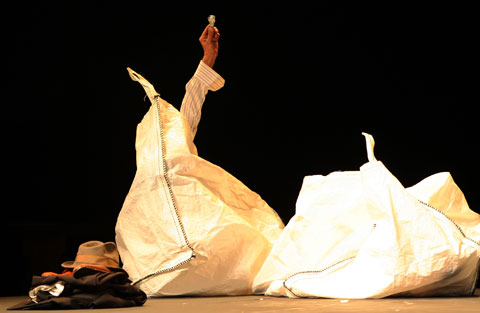
SAD CLOWNS Antic and stark, Brook’s assemblage of Beckett pieces wends its shadowy way between vaudeville and poem. |
Sometimes Samuel Beckett is baggy pants whittled to the contours of a Giacometti sculpture. Eminent British director Peter Brook, now 86, not only gets that but also relates to it. He has spent the latter part of a long career, the last 40 years of it based in Paris, paring down, as if to reduce theater to its essence. So don't turn up at the Paramount Center, where ArtsEmerson is celebrating Brook (through March 27), looking to be wowed by the director's gymnastic A Midsummer Night's Dream in a gleaming white box, his Salome with sets by Salvador Dalí, or his nine-hour adaptation of The Mahabharata. Fragments, made up of short texts by Beckett, and The Grand Inquisitor, taken from Dostoevsky's The Brothers Karamazov, are about an hour long each, and the bells and whistles are strictly comic or philosophic.
Both antic and stark, Fragments (co-directed by Marie Hélène Estienne) wends its shadowy way between vaudeville and poem. In the course of the performance, the number of persons on stage moves between two and one before exploding into three — as well as into an uncharacteristic burst of color that underlines the exquisite plainness that has gone before. In the manner of its Nobel-winning author and celebrated helmsman, the production, too, pares itself down. The curtain goes up on a handful of spare, spotlit set pieces carefully arranged on the Paramount Mainstage. But as the need for the furnishings is exhausted, the actors bear them away until all that remains is the narrow bench on which the three brightly clad if sadly faded (and in one case bearded) belles of Beckett's 1965 Come and Go lock hands in "the old way" as they wait for the Reaper.
Rough for Theatre 1, which opens the evening, hails from the late 1950s and was originally titled Fragment de théâtre; it's a sort of speed date in which a potential Vladimir and Estragon meet for the first time when a few bars played on a blind beggar's fiddle lure a one-legged man from his lair one gray day in winter. Beckett, Brook says, could spend weeks honing a single phrase to perfection. The director approaches the work in the same way, shaping the rhythms just so, as the sightless, self-described "poor old man," his fragmented plaints interrupted by momentary enthusiasm for tinned baked beans, and the now ingratiating, now irascible crippled courtier consider an alliance that ends, before it begins, in a freeze frame of violence. Long-time Brook collaborators Bruce Myers and Yoshi Oïda wring every bit of mordant, manic, cranky humor from the work before teaming up again on Act Without Words II (also from the '50s), a mechanistic mime play in which Mack Sennett meets Sisyphus. It's performed here with all the rubber-faced, delicate buffoonery its highly physical slapstick requires.